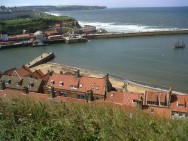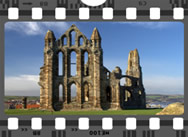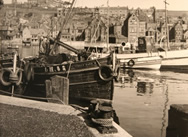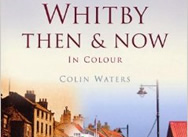Medieval Whitby
Caedmon
Caedmon, arguably the earliest know English poet, began his career as a herdsman at Whitby Abbey during the time of St. Hilda (657-680 AD). According to Bede Caedmon, previously having shown no musical or artistic talent, learnt to compose one night through a dream in which God came to him. This so inspired Caedmon that he later became a devout Monk and continued his praise of God through his religious poetry. Caedmon's only surviving work is known as Caedmon's Hymn and is a poem of praise to God in honour of the dream that first inspired him. The poem is one of the earliest examples of Old English and is thought to be, along with three other examples, one of the earliest example of Old English poetry.
Caedmon's Hymn
Nu scolon herigean heofonrices Weard
Meotodes meahte and his modgethanc
Weorc Wuldor-Faedor swa he wundra gehwaes
ece Drihten, or onstealde
He aerest sceop ielda bearnum
Heofen to hrofe halig Scyppend
ece Drihten aefter teode
firum foldan Frea aelmithig
Modern English Translation
Now let me praise the keeper of Heaven's kingdom,
The might of the Creator, and his thought,
The work of the Father of glory, how each of wonders
The Eternal Lord established in the beginning.
He first created for the sons of men
Heaven as a roof, the holy Creator,
Then Middle-earth the keeper of mankind,
The Eternal Lord, afterwards made,
The earth for men, the Almighty Lord.
St Bede
Bede (672-735 AD) was a Benedictine Monk, author and scholar from the Kingdom of Northumbria. His most famous work is undoubtedly 'Historia ecclesiastica gentis Anglorum' (The Ecclesiastical History of the English People) which has earned him his reputation as the father of English history. Not only known for his historical recordings but also for his religious career Bede is regarded as a Doctor of the Church by the Roman Catholic Church; the only English man to have ever received this theologically significant title. All that is know of Bede's own life comes from a limited amount of autobiographical details in his book Historia (Book V, Chapter 24), in which he tells us that after having being placed in a monastery in Wearmouth at the age of seven he then became a deacon at 19 and finally a priest by the age of 30. During this progression he spent his day to day life teaching and writing. After his death in 735 AD he was buried at Jarrow and then moved to Durham Cathedral at a later date. Much of the knowledge we have of St Hilda, Whitby Abbey, Caedmon and the local area of the time come from the pages of his work.
Advertisement...

Whitby Gallery Photo

Whitby Movies

Whitby in 1959

To Make You Smile
I throw myself into everything I undertake... Why don't you go and dig a very deep hole?
Advertisement...

Advertisement...




